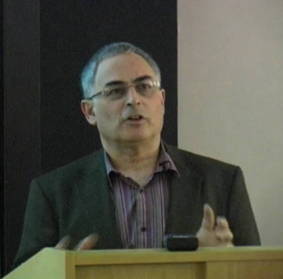

Just to give a quick summary of some findings before I hand over to Santi. The general idea of the project was very much borne out by our research: marriage and the family were central issues for the young Bangladeshis, both in the UK and in Bangladesh, and there was plenty of material to look at in these areas. Almost all of these young people were caught to some degree or another between the traditional Bangladeshi arranged marriages and with the Western style culture of dating and romantic love. The new forms and interpretations of Islam, what I have called modernist Islam, were clearly in part providing people with a third option, something which was modern but it was not Western, an alternative way to see what your life was or could be about.
Many Islamic organisations whether officially or incidentally proved to have a significant role in providing occasions for meeting suitable marriage partners. Of course meeting suitable partners is a bit of an issue, particularly if you are following strict Muslim observance. In this case, young men and young women are not supposed to meet before marriage, so how do you get to meet possible partners - particularly if the old culture of arranged marriages is not working so well? I've already mentioned the organisation Islamic Circles who have a whole series of meetings in conditions that are thought to be Islamically appropriate and so on.
A third point here is that Islamic commitment can provide a way to negotiate with parents about possible marriage choices - this is something that Santi has written about elsewhere, and which she will say a bit about later on today.
Young Bangladeshis remain attached to their families, both in Bangladesh and in the UK. This is still very much a culture in which people keep connections with the wider family. But there is quite a big gap in value between parental and younger generations, especially in the UK. And this often gets expressed in terms of young people's greater commitment to Islamic piety. So a very common pattern is young people who are heavily critical of their parents' form of Islamic observance: "Our parents really don't know about Islam, we know what it's about, what they're doing is just Bangladeshi culture". Issues of identity are quite significant for a lot of people to whom we spoke, particularly in the UK. Again, the whole issue of Islamophobia, of hostility to Islam, came up quite a bit. People see Islam as under attack by the West. Many people were clearly choosing to emphasise their Muslim identity partly in response to that.
And a last point, which was quite noticeable, was how much more serious young British Bangladeshis tend to be about Islamic commitment compared to the Bangladeshis in urban Bangladesh. And I think again that links to the very different situation here in the UK. In Bangladesh, this is of course is a Muslim majority country in which 90% of the population are Muslims. There is no feeling that being Muslim marks you out and makes you different. In the UK, it's obviously quite a different thing, especially over the last few years when the whole question of Islam has become so politicised.
Young Bangladeshi Muslims, however, both in the UK and in Bangladesh, see Islam as modern and relevant for today's world. We have lots of versions of this in how people would talk about Islam and explain its relevance, you get a bit of that again in Santi's presentation, particularly in relation to something which became quite a key thing, the question of the insecurity of relationships. People felt that today's world was increasingly uncertain, insecure. You didn't know whom you could trust, you were not sure what sort of background people were coming from, and the move towards Islam tended to be very much connected with this, again this is something Santi will talk about.
As I said this is really just an interim report so more will be happening, and if anyone wants to follow there'll be updates posted on the project website as we go along. So that's all from me, and I'll hand on now to my colleague and the director of the project, Santi Rozario.